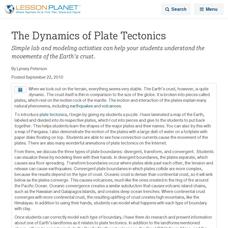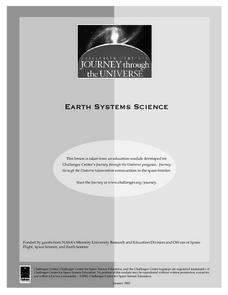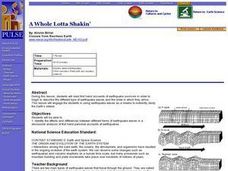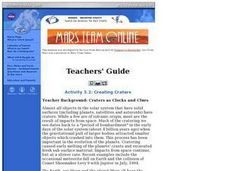Curated OER
Stressed to a Fault!
Eighth graders describe how stress builds up in the Earth's crust by the movement of tectonic plates. In groups, they relate the three types of stresses to the types of plate movements and explain how the stress causes faults to form. ...
Curated OER
Follow the Sun
Students use a simple model of the Earth and Sun as seen from space to explore the sun's apparent movement across the sky over the course of a day and year. They consider the apparent direction of movement and changes in the sun's angle.
Curated OER
Astronomy with a Stick
Students describe the movement of the Earth as it relates to the sun and
formulate a hypothesis for the movement and the changing length of the shadow. They express the relationship between the sun and the Earth and how that causes the...
Curated OER
Volcanoes
A thorough description of volcanoes appears in this Earth science learning exercise. Learners read facts about volcanoes and answer 20 multiple choice comprehension questions. The answers appear at the end of the learning exercise.
Curated OER
The Dynamics of Plate Tectonics
Simple lab and modeling activities can help your students understand the movements of the Earth's crust.
Curated OER
Plate Tectonics Vocabulary
In this plate tectonics worksheet, students match 9 terms with their definitions. Topics include the types of boundaries, the layers of the Earth's crust, plate tectonics and continental drift.
Curated OER
Water Cycle
Ninth graders explore ways water moves through various reservoirs on Earth, examine how human activities change water cycle, investigate substances present in water that indicate human activity, and discuss how understanding water cycle...
Curated OER
Environmental Health Hazards and Children
Students are introduced to the environmental hazards their community is facing. In groups, they develop a list of the ways humans have changed the Earth and how these changes have lead to environmental hazards. They record their...
Curated OER
Air and Water in the Environment
Students demonstrate an awareness of air as a substance that surrounds us and takes up space, and whose movement we feel as wind. They predict and describe how local weather conditions affect living things, including themselves.
Curated OER
The Sun and Moon
Students understand basic concepts about Earth, the Sun and the Moon,
such as relative movement and the phases of the moon. Through discussion, looking at pictures, listening to Native American stories, observing, and building models,...
Curated OER
The Tropopause
In this tropopause worksheet, students read about the temperature of the air in the tropopause or the layer of the atmosphere closest to the Earth. They answer four critical thinking questions about this layer and the energy changes that...
Curated OER
A New Slant On The Seasons
Students identify how the tilt and position of the Earth causes the seasons. After a discussion of the seasons and when they begin. Using themselves as the objects in the universe, they role play how the rotational movement of the...
Curated OER
THE INCREDIBLE JOURNEY
Students describe the movement of water within the water cycle and identify the states of water as it moves through the water cycle.
Curated OER
Sucking Students into an Understanding of Air Pressure and Vacuums
Learners develop and test their ideas about air pressure and vacuums by conducting several investigations into the movement of fluids in tubes.
Curated OER
Me and My Shadow
Students apply the process of scientific inquiries or technological design to explore the explanations of the daily patterns of the Earth's rotation. They record different shadow lengths showing the apparent movement of the sun through...
Curated OER
Plate Tectonics: Movin' and Shakin'
Students are introduced to the causes of plate movements and the hazards they present. They plot the location of 50 earthquakes and 50 volcanic eruptions on a map and explore the relationships between plate tectonics, earthquakes, and...
Curated OER
Glacial Striation Investigation
Learners operate a GPS unit to investigate the direction of glacier movement. They describe the motion of glacier movement by interpreting a graph. Students explain how scientists use glacier striations to determine glacier movement.
Curated OER
A Whole Lotta Shakin'
Students read first hand accounts of earthquake survivors in order to begin the describe the different types of earthquake waves and the order in which they arrive. They engage in using earthquake waves as a means to indirectly study the...
Curated OER
Exploring Plate Tectonics
In this plate tectonics worksheet, students answer questions about plate movement, the types of boundaries, the history of Earth's crusts and plate tectonics. They use an on line source to get their answers.
Curated OER
Round and Round-The Water Cycle
Students explore the water cycle. In this earth science lesson, students work in small groups to read various books on the water cycle and take notes on chart paper. Students share their notes and teach a younger audience what they have...
Curated OER
Glaciers
Seventh graders summarize how Earth processes today are similar to
those that occurred in the past. They read excerpts from John Muir's "Yosemite Glaciers" and explain how slow geologic processes have large cumulative effects over long...
Curated OER
TRB 5:2 - Activity 3: Earthquakes
Students watch a classroom demonstration, and experiment to discover the five ways that Earth's crust shifts along a fault.
Curated OER
Nomad Land
Students explore the migratory movements of animals as they monitor their own movements throughout the school day. Climatic and feeding conditions are examined as cues for the movement.
Curated OER
Creating Craters
Students explore parts of an impact crater and compare and contrast craters found in Earth, the Moon, and Mars. Crater formation is modelled and the relationship of mass, velocity, and size of the projectile to the crater formation is...























